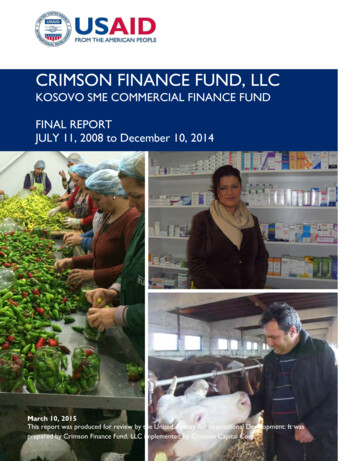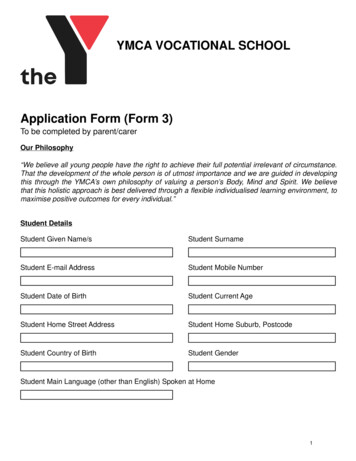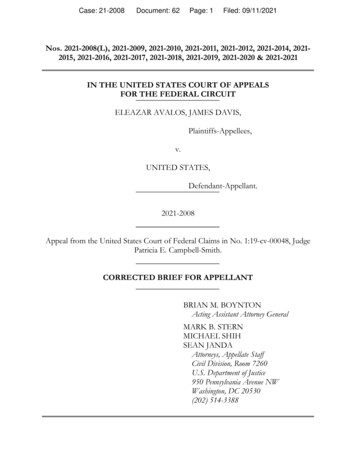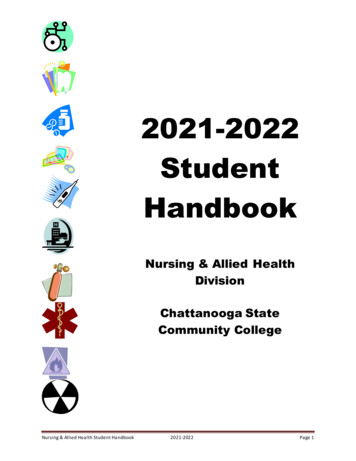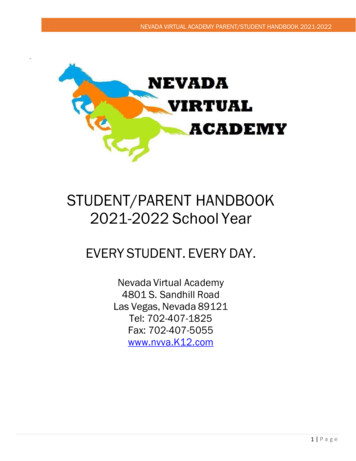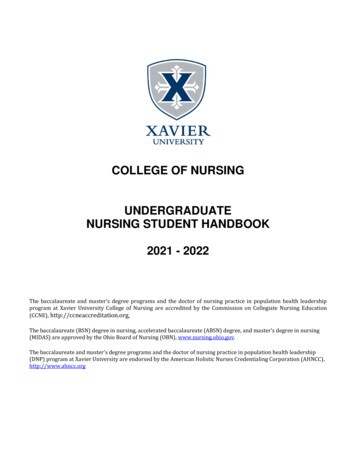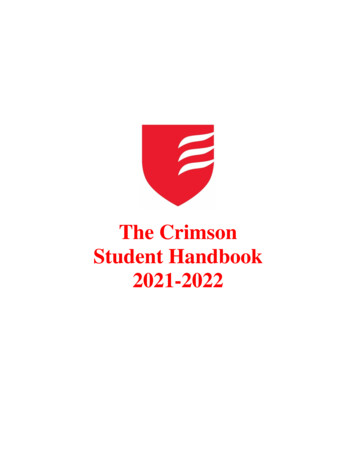
Transcription
The CrimsonStudent Handbook2021-2022
The policies and procedures written herein may be amended as necessary from time to timewith subsequent notice and subject to the approval of the College President. The information inthis 2021-2022 Crimson edition supersedes any information in any previous editions of theCrimson and is subject to change as noted above.The Crimson Student Handbook2021-2022Published byThe Office of Student Life and LearningGrove City College100 Campus DriveGrove City, PA 16127724-458-27001
Student ResponsibilitiesBy choosing Grove City College, you enjoy the privileges and accept the responsibilities of being a member ofthe campus community. This includes the obligation to know and adhere to college policies and standards asdescribed in this Handbook and in other official College documents. You are also fully expected to abide by allapplicable civil laws and regulations.As a student here, you are required to abide by the written policies, but your decisions and actions should reflectthese principles even outside the literal boundaries of the written policies. Ultimately, you should conductyourself in ways that bring honor to God, the College, and yourself. This includes demonstrating honesty,integrity, respect, compassion, encouragement of others, self-discipline, stewardship, good sportsmanship,freedom from discrimination and prejudice, and social responsibility. We have confidence and faith that youwill contribute positively to this campus community.2
Greetings from the Office of the PresidentDear Students,A key distinctive of Grove City College is how we value our community. We are intentional about the way welearn and live together. At a time when civility and respect is on the decline, we strive to emphasize theimportance of love of neighbor as the foundation of our campus life. This handbook is an important componentof our community-building efforts. You will read about the almost countless opportunities that await you. Youwill also be encouraged to act at all times in a manner that is safe and cooperative. As an academic communitythat strives to be Christ-centered, we seek to cultivate the virtuous life, marked by kindness, generosity,courtesy and hospitality. Our well-deserved reputation as one of the friendliest colleges in America means weare all cultural stewards of this blessed institution. Brenda and I look forward to being a part of your lives andgetting to know as many of you as possible. Please drop me a note if you want to visit or grab a meal together.May God bless you abundantly this year.Warm regards,Paul J. McNulty ’80Greetings from the President of your Student Government [SGA]Greetings Men and Women of Grove City College,Welcome to 2021 – 2022 college year! Whether it is your first or last year or somewhere in between, we will nodoubt learn a lot from our experiences this year. In every chapter in life, there are many different lessons to belearned. You might think that the biggest lessons you’ll learn in college will come from the books or lectures.This may be true, but it is important to not lose sight of other important lessons learned outside of the pages inyour six-inch thick textbook. It is said that college is meant to expand your knowledge and sharpen your skills.By all means, get good grades, work hard on coursework, and do your best academically. However, it is of vitalimportance to not accomplish these things at the expense of learning other lessons from other experiences.Grove City College fosters a unique and spectacular environment that allows for deep and profoundlymeaningful relationships with fellow students to professors to administration to the housekeeping staff thatclean your hall. Through these people, I’m willing to wager a Grove City student will learn their deepest andmost profound lessons in their college career. Your acquaintances will become colleagues, colleagues tofriends, and friends to family.Take advantage of your time just beginning or time coming to an end this year. Pay no mind to fear andinsecurity. If college emphasizes a quality in an individual, I believe it to be courage. Lean into the Lord andtrust that you are here for a reason even if that reason is yet to be discovered.“Have I not commanded you? Be strong and courageous. Do not be afraid; do not be discouraged, forthe Lord your God will be with you wherever you go.” Joshua 1:9Take heart,Zackery CoryellGrove City College ‘22Executive President, Student Government Association3
Purpose and Identity of Grove City CollegeSince its founding in 1876, Grove City College, committed to Christian principles, has striven to be equal inacademic quality to the finest four-year colleges. It seeks to provide liberal and professional education of thehighest excellence in the reach of families with modest means who desire a college which will strengthen theirchildren’s spiritual and moral character.When the College was chartered, a broad, Christian-based cultural consensus prevailed in America. By charter,the doors of the College were open to qualified students “without regard to religious test or belief.”The founders of Grove City College, consciously avoiding narrow sectarianism, held a vision of Christiansociety transcending denomination, creeds, and confessions. They were committed to the advancement of freeenterprise, civil and religious liberty, representative government, arts and letters, and science and technology.Believing that the fruits of civilization would be destroyed if the religious and ethical roots were allowed towither, the founders intended that the claims of Christ as God and Savior and of inspired Scripture be presentedto all.They hoped that through its program of intellectual, moral, and spiritual education, Grove City College wouldproduce young leaders, whatever their creed or confession, capable of pushing civilization forward on everyfrontier.Grove City College remains true to the vision of its founders. Rejecting relativism and secularism, it fostersintellectual, moral, spiritual, and social development consistent with a commitment to Christian truth, morals,and freedom. Rather than political, ideological, or philosophical agendas, objective truth continues as the goalof liberal learning.The core of the curriculum, particularly in the humanities, consists of books, thinkers, and ideas proven acrossthe ages to be of value in the quest for knowledge. Intellectual inquiry remains open to the questions religionraises and affirms the answers Christianity offers.The ethical absolutes of the Ten Commandments and Christ’s moral teaching guide the effort to developintellect and character in the classroom, chapel, and cocurricular activities. And while many points of view areexamined, the College unapologetically advocates preservation of America’s religious, political, and economicheritage of individual freedom and responsibility.Look on the GCC Intranethttps://my.gcc.edu/Athletic and Event SchedulesCampus OrganizationsStudent PhotosPlaces to Go and Things to DoRoom Reservations & Event Calendars4
TABLE OF CONTENTSAcademic Life*6 – 10Academic Integrity6Honesty in Learning Policy6Grade Appeals Procedure9Community Life11 – 22Community Standards11Non-Disciplinary Policy15Student Conduct15Student Conduct Hearing16Appeal Process17Explanation of Disciplinary Sanctions18Expectations for Student Athletes19Expectations for Campus Organizations20Further Explanation of Drug and Alcohol Policy21Campus Offices and Departments23 – 98Academic Resource Center23Bookstore24Campus Events25Campus Safety26Career Services Office32Counseling Services33Chapel34Campus Ministries36Financial Aid37Food Service40Health and Wellness43Information Technology Services45Global Programs and Study Abroad50Intramural and Club Sports52Library53Mail Room53Media Services54Operations Department55Print Production Services58Registrar’s Office58Residence Life59Student Accounts: Billing and Payments85Student Activities92Student Employment93Student Government Association94Student Life and Learning Office96Student Payroll97Writing Center98General Policies99 – 104Unlawful Discrimination: Discriminatory Harassment99Sexual Harassment Policy99Sexual Violence Policy102Confidential Information Policy103Student Records103Policy for Use of a Student’s Image or Voice104Grove City College Identity (Logo/Brand) Usage Policy104Policy Concerning Student Dress104Sunbathing104Policy Concerning Student Enterprise (Student-Run Business) 104Appendix A: State and Federal Laws105 – 107Appendix B: Emergency Preparedness108 – 119* Please see the 2021-2022 Academic Bulletin for additional information concerning academic life5
ACADEMIC LIFEPlease see the 2021-2022 Bulletin for information concerning academic policies, services and expectations.Students are responsible to know and comply with the contents of the Bulletin, particularly the sections whichrelate to their major and general academic requirements.Information found in the Bulletin is not typically duplicated in The Crimson. However, the centrality ofacademic integrity to the Grove City College community, and to educational excellence, cannot be overstated.For this reason the College’s Honesty in Learning Policy can be found in both documents and should beadhered to strictly. Violation of this policy is not consistent with the Community Standards of Grove CityCollege and will be addressed accordingly. For your convenience, the College’s grade appeals procedure is alsoincluded below.ACADEMIC INTEGRITYThe Grove City College community maintains strict standards for academic integrity and honesty. TheCollege’s standards for honesty in the learning process and the procedures to be followed, as passed by theFaculty, are outlined below and include the pledge, the policy and the process.The Pledge: Upholding the Honesty in Learning PolicyEvery Grove City College student has already pledged to uphold the Honesty in Learning policy. The closingsentences of the application for admission include a commitment to abide by “the academic and non-academicregulations” of the College. Thus, all academic work is explicitly pledged, although some professors mayrequest an additional affirmation on a given assignment.The Policy: Honesty in LearningFaculty will inform students of behavior appropriate for maintenance of the Honesty in Learning policy as itpertains to their particular courses and disciplines, including the following:1.Doing Papers, Outside Work. Work done out of class, which a student submits as his/her ownwork to a professor, should be his/her own and should not contain that which has beenknowingly obtained from another, other than properly credited references, sources, and citations.2.Taking Exams, Tests, Quizzes. Work done on a test, exam, or quiz, which a student submits to aprofessor, should be his/her own and should not contain that which has been knowingly obtainedfrom another. The use of electronic devices (e.g., smartphones) during exams, tests, and quizzeswithout the expressed permission of the instructor/proctor is prohibited.3.Instructor-Imposed Limitations. The work which a student submits to a professor should beprepared in accordance with the rules, limitations, and regulations laid down by the professor inthe course, which rules are often intended to put students on an equal footing.4.Preparing for Exams. A student should not seek to gain an advantage in an exam he/she is aboutto take by obtaining advanced access to particular questions or advance copies of a professor’sexam.5.A student should not cooperate with, aid or encourage another student to violate the above rules,even though he himself (or she herself) receives no direct benefit to his/her grade.6.Each professor should take precautions to protect the honest student.ImplementationA student who violates, or assists another to violate, the Honesty in Learning policy shall be penalized with aminimum of a failing grade for the specific work for which the dishonesty was committed. More severepenalties may be imposed by faculty, including failure in the course. All alleged and actual violations are tofollow the Honesty in Learning Policy process.6
Special Note: PlagiarismPlagiarism is a serious violation of moral and academic principles. It involves claiming as one’s own originalwork the ideas, phrasing, or creative work of another person. As such, plagiarism is a direct violation of thebiblical commandments against stealing, bearing false witness, and covetousness; thus, the Grove City Collegepolicy. The College encourages students to think seriously about the demands of their Christian faith in regardto this issue.The College reminds students that plagiarism includes the following:1.Any direct quotation of another’s words, from simple phrasing to longer passages, without usingquotation marks and properly citing the source of those words.2.Any summary or paraphrase of another’s ideas without properly citing the source of those ideas.3.Any information that is not common knowledge—including facts, statistics, graphics,drawings—without proper citation of sources.4.Any cutting and pasting of verbal or graphic materials from another source—including books,databases, web sites, journals, newspapers, etc.—without the proper citation for each of thesources of those materials; this includes any copyrighted artwork, graphics, or photographydownloaded from the Internet without proper citation.5.Any wholesale “borrowing,” theft, or purchasing of another’s work and presenting it as one’sown, whether from the Internet or from another source.6.Any presentation of “ghost-written” papers—whether paid for or not—as one’s own originalwork.7.Making one’s work available for copying by others, as well as copying work posted on theInternet or otherwise made available by another.The Process: How the Honesty in Learning Policy WorksPlease note: This process is at all stages confidential. Final completion of all stages should be no later than 25class days following the initial report. For the purposes of the implementation of The Process, a class day shallbe considered a weekday (Monday – Friday) on which regularly scheduled classes are held during the fall orspring semester of any given academic year. The Student-Faculty Review Committee will make a reasonableeffort to meet and consider allegations of violations of the Policy made against a student during the last weeksof a semester (including finals week). It may not be possible, however, to convene a committee of five studentsand five faculty at the end of a semester or after the semester has concluded. Therefore, the student againstwhom an allegation has been made can agree, in writing, to have his or her case considered by a ReviewCommittee made up of those students and faculty from the Committee as a whole who can attend on shortnotice. All decisions will require a super-majority vote. Any academic integrity issue unresolved during theregular fall or spring semester will be addressed during the next regular semester.Reporting a violation1.If a student believes he or she observed a violation of the Honesty in Learning policy, he or shewill fill out an online report of the alleged violation which is automatically sent to the professorof that particular course and the chair of the Student-Faculty Review Committee (SFRC). Thisreport should be filed within five class days of discovering the alleged violation.2.If a faculty member believes he or she observed a violation of the Honesty in Learning policy, heor she will fill out an online report of the alleged violation which is automatically sent to thechair of the SFRC. This report should be filed within five class days of discovering the allegedviolation.7
Once the violation is reported3.The faculty member then may meet with the student(s) who allegedly committed the violation. Ifthe report has been submitted by someone other than the faculty member, the faculty memberalso may meet separately with the person who submitted the report. The professor may seek theadvice of the Consultation Panel beforehand. The Consultation Panel will be composed of threeprofessors who will be called upon by the Consultation Panel Coordinator at that time. Thispanel is advisory in nature and helps the faculty member evaluate the merits of an allegedviolation of the Honesty in Learning policy. All meetings must be concluded within five classdays of receiving the report.a. If the student:i. admits to violating the Honesty in Learning policy, the student shall be penalized witha minimum of a failing grade for the specific work under review. SFRC will issue thesanction. This will help guarantee consistency and equity in the sanction.ii. denies that a violation occurred but the professor maintains the contrary, the SFRCwill hear from all involved parties and make a decision.b. If a faculty member determines that:i. no violation has occurred, he or she submits an Honesty in Learning resolution formto the chair of the SFRC. At that point, the entire matter is dropped and all records ofthe alleged violation are destroyed.ii. a violation did occur, he or she completes a resolution form, which includes arecommendation for a proposed sanction and sends it to the SFRC and the Provost’sOffice. From this point, the procedure follows the steps described below under “Oncethe Student-Faculty Review Committee (SFRC) receives the resolution form.”iii. In either case, the faculty member has two class days to submit the Honesty inLearning Resolution Form.Once the Student-Faculty Review Committee receives the resolution form4.Once the Student-Faculty review Committee (SFRC) receives the resolution form, theCommittee has five class days to resolve the matter.5.The chair of the SFRC, a non-voting member, serves as an ombudsman and coordinates theactivity of the SFRC.6.The Committee chair selects five students and five professors from the pool of electedrepresentatives to address the matter. All decisions require a super-majority of seven out of tenvotes. If a decision falls short of a super-majority, then the student is exonerated and all recordsof the alleged violation are destroyed.7.The SFRC Committee will assemble the relevant evidence, interview the parties involved,determine if a violation was committed, and if so, what further sanction (if any) to assess. (Thestudent shall be penalized with a minimum of a failing grade for the specific work under review.SFRC will issue the sanction. This will help guarantee consistency and equity in the sanction.)8.If dissatisfied with the decision of the SFRC, students or faculty may appeal the Committee’sdecision to the dean of the school in which the alleged violation occurred within one class day.If the Dean’s decision does not provide satisfaction, the decision may be further appealed to theProvost.9.Appeals of the SFRC’s decision must be made within one class day. At each point in the appealprocess, the Dean or Provost should reach his or her decision within three class days of receivingthe appeal.10.Once the final decision has been rendered and any or all appeals exhausted by any partiesinvolved, the Provost’s Office carries out the recommended sanction.8
If the student has been involved in two or more violations of the Honesty in Learning policy, the Provost mayapply additional sanctions which may include referring the matter to the Administrative Council with therecommendation for academic dismissal.GRADE APPEALS PROCEDUREI.A student accused of violating the Honesty in Learning Policy or who claims that a course’s final gradewas determined unfairly may appeal. The student may withdraw his/her appeal at any point. If anappeal is upheld at any point in the process, the Grade Appeals Committee, as outlined in Section IVbelow, determines the new grade. The professor against whom the appeal is upheld may appeal to theProvost.II.Appeal of a course grade - Notice of intent to appeal must be sent to the professor awarding the grade nolater than 30 days after the end of the semester. The grade appeal process then must be initiated withinthe first twelve class days of the following semester and follow the procedure described in Part III.III.The appeal process must follow the procedure outlined below. At each step in the process, the decisionmaking body or the person appealing must lodge an appeal to the next level within six class days.A.The student must discuss the matter privately with the professor.B.If no satisfactory resolution is reached, the student should appeal in writing to the Chair of theDepartment in which the course is offered.C.If the appeal is denied by the Department Chair, the student may appeal in writing to the Dean ofthe respective school (Arts and Letters or Science, Engineering, and Mathematics) in which thecourse is offered.D.If satisfactory resolution still has not occurred, the student may appeal in writing to the Provost.IV.If the Provost determines that the appeal is not frivolous, the Provost may call a meeting of the GradeAppeals Committee.A.Chaired by the Provost, the Grade Appeals Committee consists of two students (the StudentGovernment Association President and Vice President of Academic Affairs); the Dean and theAssistant Dean of the Alva J. Calderwood School of Arts and Letters; the Dean and the AssistantDean of the Albert A. Hopeman, Jr. School of Science, Engineering, and Mathematics; theRegistrar; two appointed faculty representatives; and six elected faculty representatives (oneeach from the six major subject areas of the College). The elected faculty representatives arechosen by the department members of their respective areas. In the event an elected facultyrepresentative is unable to attend or the appeal involves a committee member who earlier hasbeen a point of appeal in this process, the Provost will appoint an alternate from the appropriatesubject area.The six major subject areas of the college are:1.Engineering and Mathematics & Computer Science2.Education and Physical Education3.Social Sciences (Economics, History, Political Science, Psychology, andSociology)4.Humanities (English, Communication Studies, Modern Languages, Music/FineArts, Biblical and Religious Studies, and Philosophy)5.Natural Sciences (Biology, Chemistry, and Physics)6.Business, Accounting, and Entrepreneurship (including Industrial Management)The Vice President of Student Life and Learning, the Director of College Counseling, and anymembers of the College community invited by the Provost can serve as ex-officio members.Terms last for three years with no limit to the number of terms a faculty member may serve.However, no two terms may be served consecutively.9
B.V.The Grade Appeals Committee is responsible for recommending, by majority decision, either touphold or to deny the student’s appeal. The student and professor may present evidence inwriting supporting their positions. In the case of a grade appeal, the professor must present thewritten grading procedure for the course under appeal.If the appeal is upheld, the Provost, with advice from the Grade Appeals Committee, will appoint areview committee of department personnel who will review the student’s work and determine a grade.No further appeals will be permitted.PLEASE SEE THE 2021-2022 BULLETINFOR ADDITIONAL INFORMATION CONCERNING ACADEMIC LIFE10
COMMUNITY LIFEIn pursuit of its mission, Grove City College seeks to achieve the following goals: To provide an excellent education in a college which seeks to be thoroughly Christian and evangelical incharacter. To seek a Christian perspective of life which integrates all fields of learning by communicating thesignificance of the Word of God for all of life in all disciplines. To keep the door of educational opportunity open to all by maintaining low charges, thus minimizingfinancial burdens on families.Membership in the Grove City College community is a privilege. Working together, members of the Collegecontribute toward building an atmosphere that promotes excellence in all areas of campus life and learning.Students are challenged to develop intellectually, spiritually, morally, socially, emotionally, physically, and intheir responsibility to the larger community and society.They are also expected to commit themselves to upholding the Community Standards outlined below in order topromote Christian community and further the educational mission of the College. By enrolling in Grove CityCollege, each student indicates his/her acceptance of the responsibilities that come with membership in theCollege community.Members of the student body have a responsibility to call into account those students who fail to abide by theCommunity Standards. If the conduct of any member of the Grove City College student body is found to bedetrimental either to his/her personal development or that of others, action should be taken in order to restorehim/her to good standing in the community. In some situations this will require students to challenge oneanother with love and respect. At other times it will necessitate bringing questionable behavior to the attentionof the Student Life & Learning team.COMMUNITY STANDARDS DEFINEDThe following standards outline the behavioral expectations of the Grove City College student body and havebeen adopted for the well-being of both the individual and community at large. While it is our hope members ofthe student body will see the value of living by these standards, we understand that some students willperiodically choose to behave contrary to community expectations. With this in mind, the College reserves theright to take disciplinary action against any student or student organization (represented during the disciplinaryprocess by the organization’s president and faculty advisor) that violates the Grove City College CommunityStandards. In these moments, the actions the College takes are not meant to be an indictment on the student’sfaith, but rather a means by which the student is challenged and supported in aligning their behavior with theirbeliefs in a way that honors and glorifies Jesus Christ.The Grove City College student body should be defined by:1.Honesty and integrity - Members of the student body are expected to demonstrate a commitment to thetruth and to personal integrity. Examples of behavior which constitute a violation of this CommunityStandard include, but are not limited to:a)Academic dishonesty including but not limited to plagiarism, cheating and/or interfering with theacademic progress of another. (See the Honesty in Learning Policy under Academic Life.)b)Knowingly making a false statement, either orally or in writing, to any College employee oragent on a College-related matter (this includes but is not limited to lying, forgery, giving a falsereport, and/or falsely claiming not to have knowledge of a specific incident).c)Initiation or circulation of a report or warning of an impending bombing, fire, crime, emergency,or catastrophe that is known to be false.11
d)e)f)g)2.Using another person’s College ID card or allowing another to use one’s College ID card forentrance to residential facilities, to obtain chapel credit, to gain access to the dining hall or forany other unauthorized purpose.Knowingly being in the presence of a violation by a third party or parties of the Grove CityCollege Community Standards (failing to challenge the behavior, leave the scene or bring thematter to the attention of the Student Life & Learning Team).Fleeing the scene of a policy violation after having been, or while being, confronted by a Collegeemployee.Violation of the College’s off-campus living policy precluding individual students, groups ofstudents and/or campus-based organizations from renting, buying, occupying or living in offcampus residences in the contravention of College policy.Civility and respect - Members of the student body are expected to treat others with respect, conductingthemselves in ways that promote the physical and emotional well-being of others and demonstratingrespect for students, faculty, staff, administration and others in their respective roles and responsibilities.Examples of behavior which constitute a violation of this Community Standard include, but are notlimited to:a)Communicating by voice, graphic means, electronically, or by telephone (whether or not aconversation takes place) or using any other information resource that has the effect of harassingand/or alarming another person (intentionally or unintentionally).b)Any unauthorized use of electronics or other devices to make an audio or video record of anyperson without his/her prior knowledge, or without his/her effective consent when such arecording is intended or likely to cause injury or distress.c)Threatening or actual bodily harm, stalking, harassment, unwelcome bodily contact, and/or theprojection of a real or perceived danger to any person.d)Engaging in sexual contact or behavior with another person (sexual intercourse, touching thesexual or other intimate parts of another person, inappropriate disrobing, or any other physicalcontact or touching of a sexual nature) without the consent of that person or by compulsionthrough physical force or fear. Consent is defined as a freely given agreement by a competentperson. A person is deemed incapable of giving consent when that person does not fullyunderstand the nature of the consent and/or is not competent to give consent (e.g., due to thestudent’s age or use of drugs or alcohol, or because of an intellectual or other disability thatprevents the student from having the capacity to give consent).e)Violating Pennsylvania law and/or College policy concerning hazing (See Appendix A).f)Intentional or reckless interference with standard College activities and functions. Examples ofsuch activities/functions include but are not limited to studying, teaching, public speaking,research, administration of the College, or emergency (Campus Safety,
Faculty, are outlined below and include the pledge, the policy and the process. The Pledge: Upholding the Honesty in Learning Policy Every Grove City College student has already pledged to uphold the Honesty in Learning policy. The closing sentences of the application for admission include a commitment to abide by "the academic and non-academic


